What do women want from Scotland's independence debate?
- Published
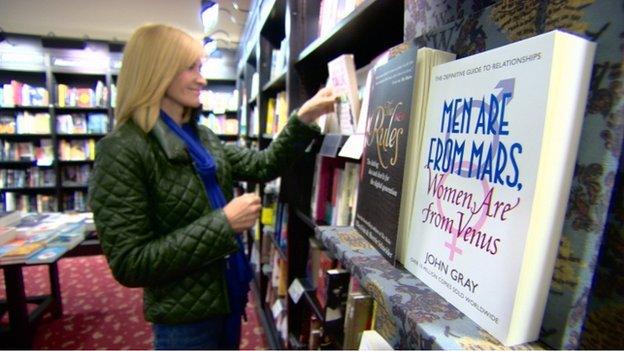
BBC presenter Jackie Bird went on a mission to find out what women want from the referendum debate
When I started making a documentary about women and the independence referendum little did I know that Maw Broon, a night at the bingo, paramedics at the roller derby, cleaning out my gutters and learning of Nicola Sturgeon's unfamiliarity with her kitchen would all play a part.
But this wasn't any ordinary political programme. To investigate what the women of Scotland want from the independence debate - never mind the outcome - we decided to have an all-female cast of contributors.
This wasn't to alienate the good men of Scotland but to ensure we crammed the programme with as many disparate female voices as possible.
The spark for "What Women Want" was a poll by the influential Scottish Social Attitudes Survey, external that highlighted a sustained gender gap in voting intentions.
For as long as the organisation has asked a question about independence - about 15 years - women have been less keen on voting Yes by a consistent six or seven percent margin. Combine that with the disproportionate number of women who say they are undecided, and you have a societal grouping that could prove pivotal for September's outcome.
We wanted to get to the root of why so many women felt unable to make a decision and why, among those who'd professed an opinion, so many felt independence wasn't the road to travel.
It's easy for people like me who've been interviewing politicians on the referendum debate since Adam was a boy to assume every word of it is fed into Scotland's homes to be analysed and debated, but that's clearly nonsense.
Nicola Sturgeon says making independence appealing to women "will crack the referendum"
Normal people have other priorities, and it could be argued that because so many women have families or are carers, our lives tend to be more fragmented. It's not that we work any harder, let's just say we often have more plates spinning than men.
On the search for women from all walks of life a night at the bingo proved an eye-opener and a humiliation. You would imagine that hearing a number and marking a card is fairly straightforward. It's not. Trailing three numbers behind the caller was a bit disconcerting; having the elderly lady next to me take over my card while marking three of her own, was downright embarrassing.
Jackie Bird goes to a bingo hall to find out what women want in the referendum on Scottish independence
When I wasn't interrupting their games the women at the bingo were keen to tell me how they felt they weren't being served by the Yes and No campaign. Time and time again I heard a plea for transparency in the debate and a hope that the politicians would stop shouting at each other and provide some facts.
Whether or not there are facts to be had in this most crucial of decisions is debatable in itself, but as far as the women we spoke to are concerned, at least some straight talking wouldn't go amiss.
The programme also decided to tackle head on the hypothesis that women are more risk averse and therefore prone to sticking with the status quo, i.e. the UK. Try telling the ladies of Edinburgh's Auld Reekie Roller Girls, who meet on a Friday night and knock lumps out of each other on roller skates, that they're a bunch of fearties.
The fact that the paramedics arrived and hauled one of the roller ladies off for a night in the infirmary was passed off as a regular, but mild inconvenience.
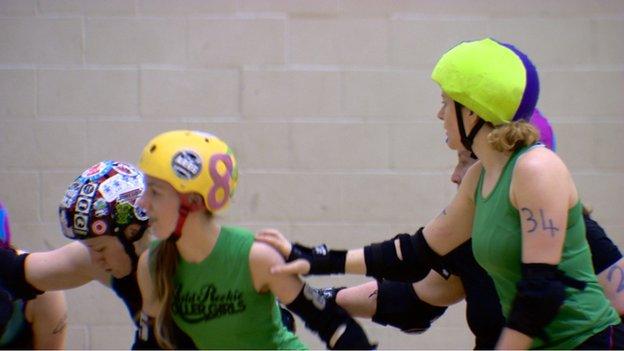
Edinburgh's Auld Reekie Roller Girls talked to Jackie Bird about independence
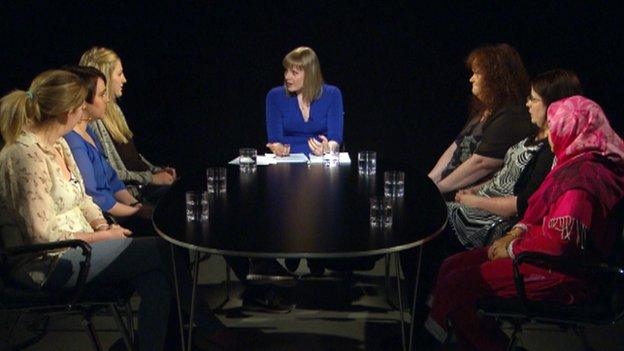
A focus group of women voters gathered to discuss the referendum
Were women simply afraid of independence and its leap into the unknown? The general consensus at the roller derby seemed to be no, but as the Roller Girls are on first name terms with the staff at the fracture clinic, perhaps they weren't an entirely representative bunch.
There was certainly more time for considered thinking at the huge wedding fair that took over much of the SECC.
Once the brides-to-be and their assorted mums and pals realised that my camera crew and I were interrupting their day to talk politics rather than place settings they were surprisingly forthcoming. I suppose you can't prepare for a life of wedded bliss and even plan a family without taking cognisance of the sort of country you want to live in.
It's clear to me, having ambushed women to carry out similar interviews six months ago, that there has been a big shift. From general apathy back then there is now a widespread hunger for information and for certainties.
As I've said, the cynic in me very much doubts either side can offer the copper-bottomed facts at least this half of the electorate so badly wants, but I hope I'm proved wrong.
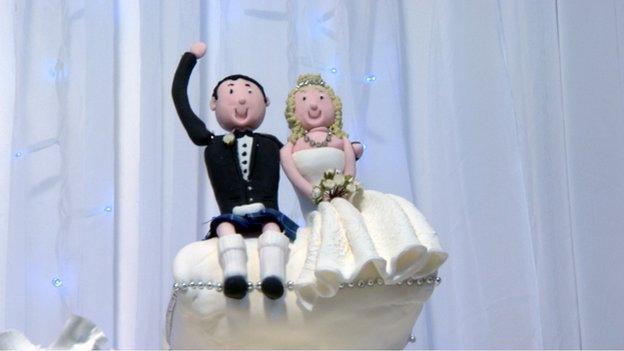
Jackie Bird asked brides-to-be about independence at the Scottish Wedding Show
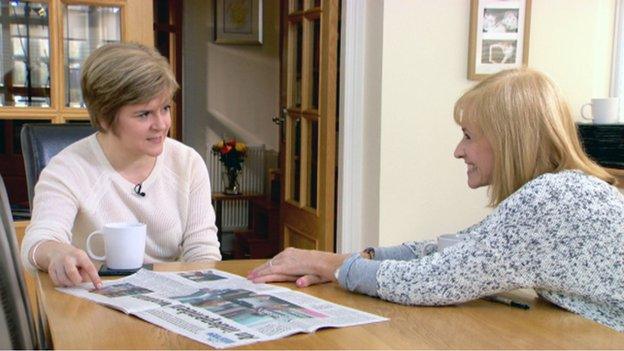
Nicola Sturgeon talked to Jackie Bird about women and independence
Away from the civilians in this battle, the seasoned political warriors we spoke to did try to convince us of the surety of their positions, as you'd expect.
Nicola Sturgeon chatted to us in her kitchen which she revealed, with disarming honesty, she rarely visited. She also conceded that unless women could be persuaded to favour independence the referendum would not be won.
We spoke to powerful women in the unionist camp too, as well as historians, writers, professors - and even a neuroscientist. We cleaned gutters - or rather I did - we shopped for clothes and put a focus group of undecided women under the spotlight and gave them a grilling.
Overall, we tried to represent some of the diverse roles Scotswomen in the 21st century find themselves in while they ponder their country's future. And did we eventually discover what women want? Of course I'm not telling you, you'll have to watch the programme to find out.
Watch 'What Women Want' on Tuesday 22 April on BBC Two Scotland at 21:00.